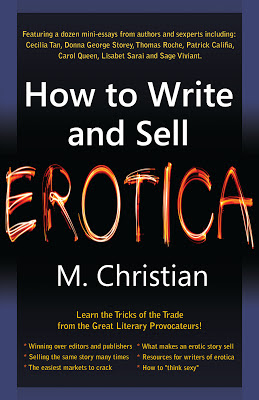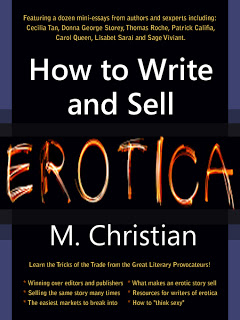The inclination is obvious, especially considering how much pressure writers can be put under to get themselves out there. But even though I call myself a Literary Streetwalker, I want to take a few hundred words to talk about when, in my opinion, it’s not a good idea to sell your creative backside.
One of the coldest rules of being an erotica author is that it’s a sexist genre: women have a slightly easier time of it than do guys— unless you’re penning gay stuff, of course. Straight men still remain the primary buyers of erotica, and they usually don’t enjoy stuff written by men. Is this homophobic? Certainly. But them’s the breaks until our society grows up. Women also don’t seem to trust anything written by a man, being suspicious that a man can’t write about sex. Is this wrong? Absolutely. But again, that’s simply the way the world works—for the moment, at least.
In this world of literary female domination, some women authors have made the mistake of selling themselves rather than their work. The temptation, like I said, is clear: turning yourself into a desirable product makes it easy to sell just about anything you do, whether it’s a book or your own underwear. Becoming a sex personality means that you carry your catalog with you; you don’t have to trouble yourself with showing people what makes you a writer worthy of reading.
There are other benefits as well. Celebrity has a special allure. There’s nothing like the adrenaline rush of people saying you’re sexy or clapping when you walk on stage. Writing, as I’ve said many times before, is a spectacularly harsh mistress. With the low pay, generally poor treatment, and little artistic recognition, it’s no wonder that so many women are seduced by the quick and easy fame—or at least recognition—of becoming a product or personality, rather than a writer.
Now I should qualify what I mean by “selling.” I’m all for writers marketing themselves and their work. Becoming an expert on something is an established marketing technique and lots of people do it very well, but there’s a huge difference between becoming an authority and actually peddling your ass: if you write articles and essays on sex and sexuality, or give advice on it, then you’re an expert; talk about who you took to bed last night and you’re selling yourself.
There are two good reasons for not crossing that line between publicity and soliciting. The first is more professional: if you create yourself as a sexual superstar, you’re severely limiting what you can do as a writer. Your sex life might get you attention, but walk away from that spotlight and you’ll find yourself in the dark: your audience having been used to you as a sex object, not as a writer, and won’t respond when you’re not writing about being a pro-dom, sex activist, or porn star. Flexibility, after all, is key to being a writer because it gives you a plethora of genres and venues in which to expand and play. Your erotica didn’t sell? Try horror. Horror didn’t work? Try romance, and so forth. Unless, that is, you turn yourself into nothing but a sex object—then that’s all you can be.
If you want to turn yourself into a sexual superstar, don’t let me stop you: it’s your right as a free person. But I sincerely recommend that you resist the temptation to market yourself and not your work. Besides being a potential dead end career-wise, the other reason for not writing about your own sex life and putting it out there for hundreds, maybe thousands and—who knows?—millions of people to read: fans.
Not to put down the handsome and well-groomed reading world, but way too many of my female writer friends tell me that having die-hard admirers of their sexual personas, rather than their stories, is more a curse than a blessing—and really, really creepy. I’d say unwelcome advances are another reason to write stories about all kinds of things, and not about how wonderful it was jerk off the entire swim team.












